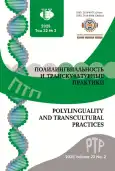Literary Russian Studies at the Russian-Armenian University (1991-2021): Materials for “The Great Encyclopedia of Russian Studies in Eurasia”
- Authors: Aksenova D.A.1
-
Affiliations:
- A.M. Gorky Institute of World Literature of the Russian Academy of Science
- Issue: Vol 22, No 2 (2025)
- Pages: 449-459
- Section: INFORMATIONAL ARTICLES
- URL: https://journal-vniispk.ru/2618-897X/article/view/326863
- DOI: https://doi.org/10.22363/2618-897X-2025-22-2-449-459
- EDN: https://elibrary.ru/RUVCZW
- ID: 326863
Cite item
Full Text
Abstract
The paper reflects on the peculiarities of studying Russian literature at the Russian-Armenian (Slavic) University (Yerevan). The relevance of the work is due to the fact that it describes for the first time one of the ways to spread Russian culture in Armenia and integrate Russian and Armenian scientific literary fields. The main activities of the Department of Russian and World Literature and Culture of the Russian-Armenian University, which makes a significant contribution to the strengthening of Russian-Armenian cultural ties, are described. The study was conducted on the basis of materials from the university’s website, news articles and information provided by university staff. The article provides a description of the scientific activities of the department’s lecturers in the field of studying Russian literature, a brief description of the conferences, university courses that promote the development of interest in Russian literature and culture among university students. The analysis shows that interest in modern Russian literature, especially among young scientists, for example, the study of Russian postmodernism, is growing. The literature of the 20th century, from the Silver Age to the 1990s, is defined as the dominant era in the scientific preferences of researchers.
About the authors
Daria A. Aksenova
A.M. Gorky Institute of World Literature of the Russian Academy of Science
Author for correspondence.
Email: a.darya2809@yandex.ru
ORCID iD: 0009-0008-6161-4280
SPIN-code: 3317-8270
Postgraduate Student, a Junior Research Fellow, Department of Literatures of the Peoples of Russia and the CIS
25a, bldg 1, Povarskaya St, Moscow, 121069, Russian FederationReferences
- Amirhanyan, A.M. 2008. Russian Literature of the 19th–20th Centuries. The training manual. Yerevan: Lusabac publ. Print. (In Russ.)
- Nuralova, S.E. 2003. Russian literature of the 19th century. The training manual. Yerevan: Yerevanskiy filial IVESEP Publ. Print. (In Russ.)
- Hanyan, K.S. 2017. Russian poetry in the evaluation of Armenian critical thought of the 19th century. Educational and methodical manual. Yerevan: Lingva publ. Print. (In Russ.).
- Danielyan, E.S. 2008. Russian folk poetry. Educational manual. Yerevan. Print. (In Russ.)
- Atadganyan, I.A. 2003. Educational manual on Russian literature: folklore, ancient Russian literature, literature of the 28th century. Yerevan publ. Print. (In Russ.)
- Meliksetyan, L.S. 2013. “Beatlis as a concept in the work of U. Saroyan.” Imagining the Landscape: Views from Armenia and Japan. Slavic Research Center, Hokkaido University, Sapporo, pp. 60–68. Print. (In Russ.).
- Meliksetyan, L.S. 2004. “Chekhov’s allusions in L. Petrushevskaya’s play ‘Three Girls in Blue’.” Chekhov readings. Yerevan, pp. 48–50. Print. (In Russ.)
- Meliksetyan, L.S. 1998. “Sound images in the cycle ‘Armenia’ by Osip Mandelstam.” December readings. Yerevan, pp. 36–42. Print. (In Russ.)
- Meliksetyan, L.S. 2021. “Architecture and Stone in the Armenian Narrative by Osip Mandelstam.” Materials of Scientific Congress “Russian language in the global scientific and educational representation”, vol. 3. Moscow: Pushkin state Russian language institute publ., pp. 67–69. Print. (In Russ.).
- Margaryan, S.S., Gevorkyan, T.M., Arzumanyan, S.N., Shubin, R.V., and L.S. Meliksetyan. 2007. The program of the practical, creative course “Literary readings.” Yerevan publ. Print. (In Russ.)
- Margaryan, S.S. 2009. “Some aspects of the poetics of Leonid Andreev’s prose.” Dissertation Thesis. Yerevan. Print. (In Russ.)
- Margaryan, S.S. 2010. “Notes on the poetics of A. Voznesensky’s poem ‘Goya’.” 4th Annual Scientific Conference. Russian-Armenian University Publ. Yerevan. Print. (In Russ.)
- Margaryan, S.S. 2021. “The sounding word of Osip Mandelstam.” International Congress “The Russian Language in the Global Scientific and Educational Space”, vol. 3. Moscow. Print. (In Russ.)
- Vaneskegyan K.A. 2022. “The memory of a thing and simulation temporality in the novel ‘The Collector of Paradise’ by Evgeny Chizhov.” Stephanos, no. 3 (53), pp. 120–127. URL: https://stephanos.ru/izd/2022/2022-53-11.pdf (accessed: 17.01.2025). https://doi.org/10.24249/2309-9917-2022-53-3-120-127.
- Ayrapetyan, R.G. 2005. Christian Motifs in F.M. Dostoevsky’s “Diaries of a Writer” and “Notebooks”. Yerevan. Print. (In Russ.).
Supplementary files









